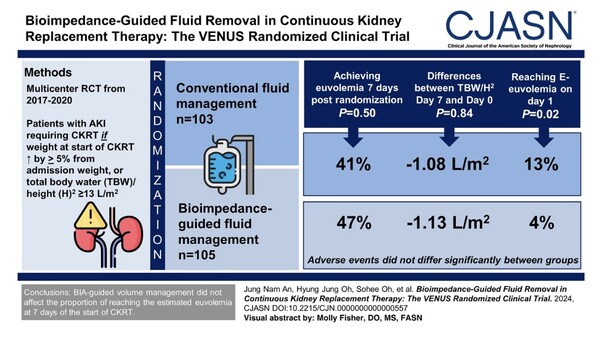Korean researchers have published findings demonstrating that bioimpedance analysis (BIA) offers more precise fluid management for patients with acute kidney injury (AKI) undergoing continuous kidney replacement therapy (CKRT).
The study, published in the Clinical Journal of the American Society of Nephrology in December last year, suggests that BIA improves short-term survival rates compared to traditional methods.

Acute kidney injury, a sudden decline in kidney function, often requires CKRT, a continuous dialysis method that operates 24/7 to replicate kidney function. However, AKI patients face a high risk of fluid overload, which increases mortality rates. Conventional fluid management methods, including monitoring body weight and fluid intake/output, often fail to accurately assess fluid status.
The VENUS randomized clinical trial evaluated whether BIA, which measures total body fluid by passing an electrical current through the body, could provide more accurate fluid management.
Professor Kim Se-joong of the Department of Nephrology at Seoul National University Bundang Hospital, who led the study, conducted a randomized controlled trial from July 2017 to July 2020, involving 208 patients with severe AKI across eight Korean hospitals. Participants were divided into two groups: one managed with conventional methods and another using BIA-guided fluid removal.
Results showed that patients in the BIA-guided group achieved fluid balance within 24 hours of CKRT initiation, compared to delayed outcomes in the control group.
The 28-day mortality rate was also lower for the BIA group (37 percent) than the control group (52 percent). There were no significant differences between the groups in hypotension or the need for blood pressure-stabilizing medication, confirming the safety of the method.

“This study highlights the potential of bioimpedance technology to improve outcomes for critically ill patients,” said Professor Kim. “These findings provide a foundation for developing clinical guidelines to manage fluid overload during CKRT effectively.”
He added that further research is needed to confirm whether BIA can consistently reduce mortality and enhance treatment outcomes in AKI patients.
Related articles
- AI developed for diagnosing lumbar central canal stenosis with abdominal CT scans
- SNUBH Prof. Lee Pyung-bok to lead World Society of Pain Clinicians
- SNUBH to strengthen severe disease treatment capabilities through restructuring in 2025
- SNUBH lymphedema clinic 1st in Korea to receive Center of Excellence in surgery from LE&RN
- SNUBH opens SNUHouse dormitory to enhance medical staff's welfare and international exchange
- SNUBH Professor Kim named inaugural president of Korean Society of Sex- and Gender-Specific Biomedical Science
- Chronic dizziness tied to stress and depression, study finds, urging rethink in treatment

